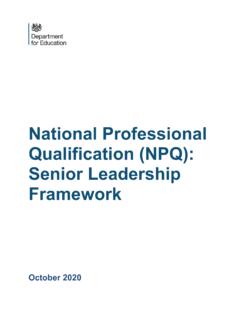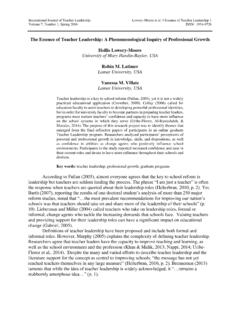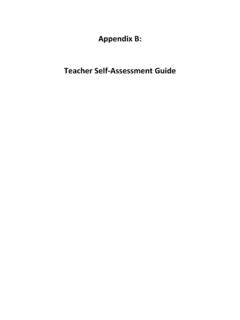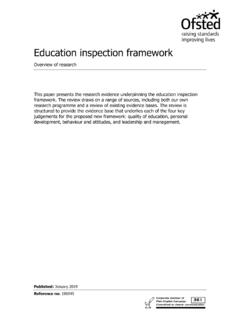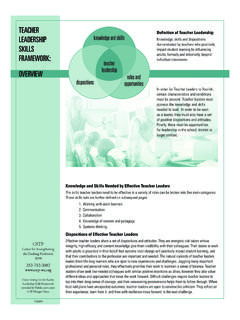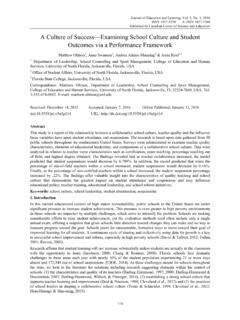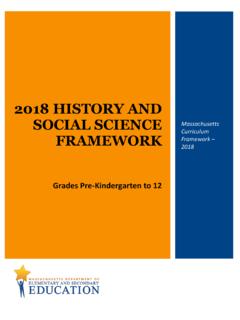Transcription of Standard for teachers’ professional development
1 Standard for teachers'. professional development Implementation guidance for school leaders, teachers, and organisations that offer professional development for teachers July 2016. Contents Introduction 3. Using this guidance 4. Definitions 4. What does professional development ' mean? 5. Programmes versus activities 5. The Standard 6. Part 1 professional development should have a clear focus on improving and evaluating pupil outcomes 7. Part 2 professional development should be underpinned by robust evidence and expertise 8. Part 3 professional development should include collaboration and expert challenge 9. Part 4 professional development programmes should be sustained over time 10.
2 Part 5 professional development must be prioritised by school leadership 11. Bibliography 12. 2. Introduction Every teacher needs to improve, not because they are not good enough, but because they can be even better.. Dylan Wiliam As the most important profession for our nation's future, teachers need considerable knowledge and skill, which need to be developed as their careers progress. As the Teachers' standards set out, teachers make the education of their pupils their first concern, and are accountable for achieving the highest possible standards in work and conduct. The Teachers' standards set out a number of expectations about professional development ; namely, that teachers should: keep their knowledge and skills as teachers up-to-date and be self-critical.
3 Take responsibility for improving teaching through appropriate professional development , responding to advice and feedback from colleagues;. demonstrate knowledge and understanding of how pupils learn and how this has an impact on teaching;. have a secure knowledge of the relevant subject(s) and curriculum areas;. reflect systematically on the effectiveness of lessons and approaches to teaching;. and know and understand how to assess the relevant subject and curriculum areas. Effective professional development for teachers is a core part of securing effective teaching. It cannot exist in isolation, rather it requires a pervasive culture of scholarship with a shared commitment for teachers to support one another to develop so that pupils benefit from the highest quality teaching.
4 The thousands of professional decisions that must be made every day need to be informed by the best evidence, knowledge and professional wisdom. Not all professional development is equally effective. Helping teachers to improve their practice takes thought, planning and effort. It requires headteachers who prioritise not only the operational aspects of teacher development but also, as Ofsted put it in their September 2015 handbook, a motivated, respected and effective teaching staff in a culture that enables pupils and staff to excel . While professional development can take many forms, the best available research 1 shows that the most effective professional development practices share similar characteristics.
5 Effective professional development 1. Cordingley, P., Higgins, S., Greany, T., Buckler, N., Coles-Jordan, D., Crisp, B., Saunders, L., Coe, R.;. Developing Great Teaching; 2015 (see bibliography at the end for full reference). 3. should be seen as a key driver not only of staff development , but also of recruitment, retention, wellbeing, and school improvement. Using this guidance This guidance should be read in conjunction with the Standard for Teachers' professional development . The Standard should be used by everyone working in, and with, schools to raise expectations for professional development , to focus on achieving the greatest improvement in pupil outcomes, and to develop our teachers as respected members of the profession.
6 It will help anyone using the Standard to understand in more detail the requirements for implementing effective professional development . In particular, the Standard should be used to support regular reflection on existing practice and discussion between teachers, headteachers and leadership teams, and those providing and supporting professional development . There are five parts to the Standard , which all need to be acted upon together to ensure effective professional development . Definitions This guidance uses: teachers' to mean all teachers, but consideration should also be given to other staff who work to support both academic and wider educational outcomes;. school leaders' to mean headteachers, leadership teams, and heads of subjects or phases.
7 This includes those working across more than one school or group of schools, with relevance to advisers in multi-academy trusts, local authorities or other school improvement organisations; and providers of professional development ' as a general term to include all those individuals or organisations (including schools) who directly provide expertise or facilitate professional development . 4. What does professional development ' mean? A number of phrases are used to describe professional development , and what these mean is not always clear. Common terms and acronyms include professional learning, continuing professional development (CPD), continuing professional development and learning (CPDL), joint practice development , and in-service training (INSET).
8 The Standard and this guidance use the term professional development ' throughout. Programmes versus activities The Standard makes a distinction between professional development activities and professional development programmes. Evidence suggests, for example, that a one-day course as a stand-alone activity without a specific focus is unlikely to have a lasting impact on pupil outcomes. That same course, however, could be used to much greater effect as part of a sustained, coherent programme which includes structured, collaborative in-school activities for teachers to refine ideas and embed approaches. A professional development programme is likely to involve many activities designed to sustain and embed practice, including, but not limited to: individual and collaborative teacher activity; well-designed formative assessment and evaluation; whole-school leadership ; and expert input.
9 5. The Standard 1. professional development should have a focus on improving and evaluating pupil outcomes. 2. professional development should be underpinned by robust evidence and expertise. 3. professional development should include collaboration and expert challenge. 4. professional development programmes should be sustained over time. And all this is underpinned by, and requires that: 5. professional development must be prioritised by school leadership . 6. Part 1 professional development should have a clear focus on improving and evaluating pupil outcomes professional development is most effective when activities have a clear purpose and link to pupil outcomes. In particular, effective professional development : has explicit relevance to participants.
10 This means the activities are designed around: individual teachers' existing experience, knowledge and needs;. the context and day-to-day experiences of teachers and their schools; and the desired outcomes for pupils;. ensures individual activities link logically to the intended pupil outcomes; and involves ongoing evaluation of how changes in practice are having an impact on pupil outcomes. professional development is most effective when: School leaders: Teachers: Providers of professional development : 1. Make the objectives 1. Make sure they are clear 1. Are clear about the clear and show the links about the intended expected impact of between activities and outcomes of activities.










